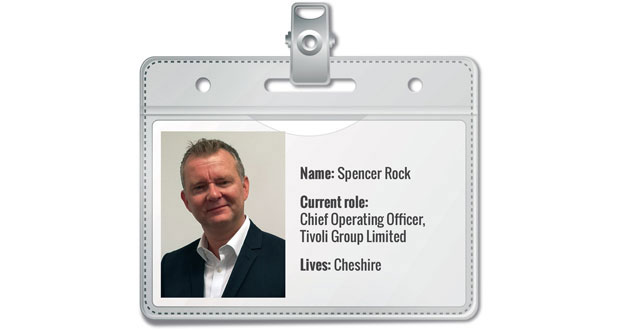Q: What first attracted you to working in FM, did you have much awareness of the profession?
I initially trained as an accountant and was looking to relocate to the North West in 2000 when a position came up for a Finance Manager working for a company called Parkman. They subsequently merged with Mouchel and then became part of Kier.
Q: How did you progress through the profession to your current role?
Parkman was an interesting proving ground! Although I was mostly in Finance, the company went through a lot of change in the three or four years I was there – a management buy out, flotation, an acquisition and then ultimately the merger between themselves and Mouchel. I then joined Mitie as their Head of Finance for the Northern Cleaning division.
Following three years, I was offered the position of Finance Director for the cleaning division on an interim basis working largely in Bristol, becoming Commercial Director for the division, and then taking on the responsibility for all of the relationship management of the large national accounts, along with the transport, retail, waste, pest and landscaping sectors. That is where I truly started to understand what good FM businesses could deliver, and the pitfalls of what can go wrong.
After half a decade in that position, I moved into a group role working for Suzanne Baxter, the Mitie CFO at the time who used my experience in finance and operations to solve business “problems”. It was all very interesting, but ultimately I wanted direct ownership/control of a business which is why, when the opportunity at Tivoli came along, it really resonated with what I wanted to do.
Q: What have you found the most challenging experiences working in FM?
I would say it’s the unravelling of what can be termed “onerous contracts” and making them commercially viable. There is never a ‘one size fits all’ solution, but invariably the resolution comes from a mix of restructuring resources, commercial negotiations, and common sense from both parties. Generally, this gets things back on track. However there have a been a few occasions when all of the above just doesn’t work, so finding a way to exit a contract without impacting the client and probably more importantly, the staff who work on the ground, can be challenging.
Q: What have you found most satisfying about working in the sector?
For me it’s seeing progress and resolving problems. Back in 2012, Mitie had a large financial services contract that was on the brink of going out to tender. The client needed savings, so I and the dedicated team met with them on a weekly basis to come up with some ideas and changes that would save them around 6-7 per cent on the contract.
Q: Are you a member of any FM association or body and if so what benefits do you think they provide?
Tivoli is a member of the British Association of Landscaping Industries (BALI). Sharing ideas, experiences and best practice is invaluable. I still personally retain my ACMA qualifications, which I’ve found invaluable and has allowed me to bridge the gap between “financial” and “operational” camps.
Q: What qualities do you think are most needed for a successful career in FM?
A couple of things really – anyone who wants to be a success needs to be “bombproof” and have an ability to juggle multiple things at once. Secondly, there’s always days when everything seems to go wrong and you want to go home and hide away, but you need to have the gumption to get up the next day, dust yourself down and start again.
Q: What has changed about your job role since the COVID-19 crisis? E.g. home working, furloughed, redeployed?
The most important part of my job has become the frequency of communication with my direct team, and ensuring they stay safe and that they aren’t suffering from “study fatigue”. I can’t stress enough the importance of staying aware of the changing nature of challenges for all employees, whether that’s childcare/shielding issues, finding places to work at home, or just the simple lack of face-to-face contact. All of those issues have come up this year, which to be honest weren’t significant considerations this time last year.
Q: What is your organisation doing to ensure the wellbeing of staff – whether working at home or returning to the workplace?
Apart from the obvious stuff, we’ve come up with some creative solutions such as buying cheap cars to follow mobile teams around where we couldn’t socially distance in crew cab vans. On top of this, we’ve put in place a range of support resources for those who are struggling with the things I mentioned earlier, which is done on a confidential basis via outsourced professional providers. We’re a sector that’s associated with being a bit “gritty” and “tough”, but even the most resilient workers suffer from lows so it’s important that our people have access to this kind of support to get them through these tough times.
Q: Do you believe the pandemic has highlighted the important role of the FM sector and what areas do you see as most key?
I’m bound to focus on green spaces of course! Throughout the pandemic our teams on the ground have certainly seen the parks and green spaces we service being occupied to a far greater extent than ever before. We’ve received some fantastic feedback about our work, so I’d hope in small part we’ve helped to make the lockdowns a little more bearable for the general public.
Q: What advice would you give to someone coming into the profession now?
Jump into it – especially if you want variety in your working life and are prepared to do the “hard yards”. I’ve seen some of the most amazing places around the UK, presented awards with Jack Whitehall, and met some genuinely humbling people in doing so. The commitment of people in FM never fails to impress me day in day out.
Q: Which of your achievements are you most proud of during your career?
It’s fair to say, my role at Tivoli and seeing the business develop over the past two years has been amazing. The team we have here has grown so much over that time – both in terms of knowledge and the way they conduct themselves and operate. I’m genuinely staggered by the progress we have made so far, and am looking forward to welcoming our colleagues from Sodexo HS into the fold in February 2021 following our recent acquisition.
Q: What do you predict could be the main changes to the FM sector post pandemic?
We’re a resilient bunch in FM – our raison d’etre is to solve problems on a daily basis, but I’m sure none of us would have expected what we’re going through now. The major change I see is there will be many different ways of working, with more emphasis put on staff’s work/life balance where possible – I believe that’s one of the few positives to have come out of the pandemic. Let’s hope 2021 sees the end of it, and we can get back to normal.





